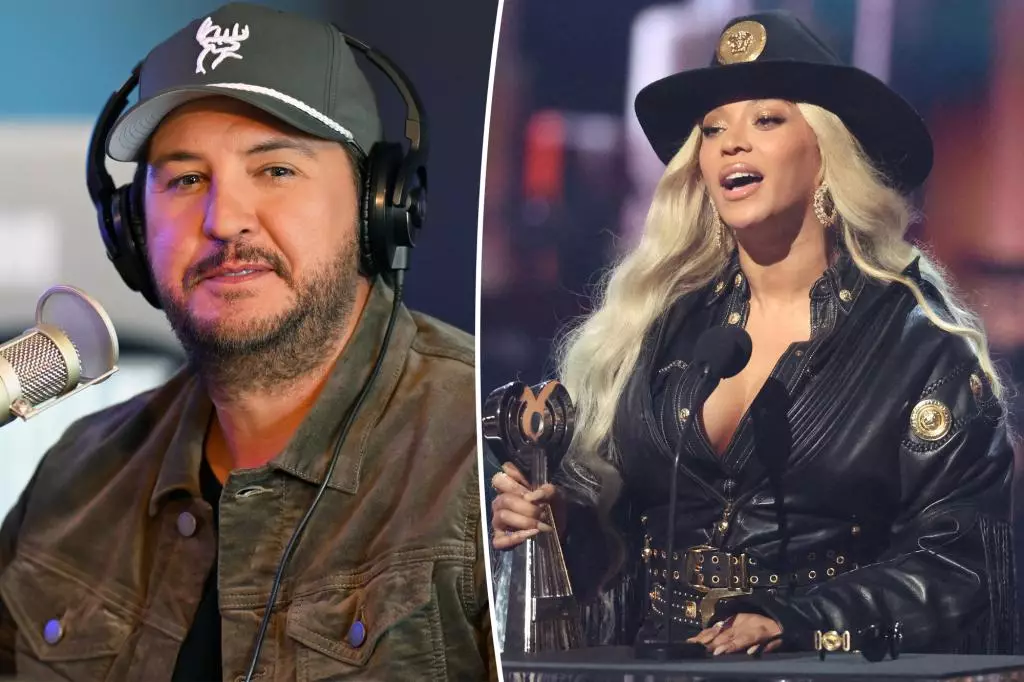Beyoncé’s foray into country music with her debut album “Cowboy Carter” has sparked both excitement and controversy within the industry. While her album has undeniably topped charts and garnered immense popularity, it has also ignited a debate about the definitions and boundaries of country music. Country music has deep roots and traditions, often tied to a sense of community and authenticity that is cherished by its dedicated fanbase. This makes the acceptance of a global pop sensation like Beyoncé into its fold a complex issue, especially considering its often insular nature.
As Luke Bryan mentioned during his appearance on SiriusXM’s “Andy Cohen Live,” the challenge comes when a well-established artist, particularly one who may not fully embody the traditional country culture, enters the scene. “If you’re gonna make country albums, come into our world and be country with us,” Bryan advocated. His perspective highlights a commonly held sentiment in the country music community: authenticity is key. It raises essential questions about what it means to be “country” and whether one must conform to specific norms or traditions to be included in the genre’s family.
The reactions to Beyoncé’s nominations incident present a polarized view of the industry. While some artists, like Dolly Parton, have defended Beyoncé’s contributions, emphasizing the merit of her artistry, others express significant concerns about the integrity of the awards system. Parton pointed out that the country music community is vast and diverse, but the recognition of artists who have dedicated their lives to the genre is equally crucial. “There’s so many wonderful country artists that… they probably thought, well, we can’t really leave out some of the ones that spend their whole life doing that,” she remarked. This sentiment captures the struggle between embracing new influences and honoring longstanding traditions in country music.
Kelly Clarkson’s experience of feeling pressure to abandon her pop roots for acceptance in country also illustrates the barriers that exist within the genre. Clarkson’s declaration that she would not conform to a singular genre reflects a broader narrative amongst artists who seek to redefine boundaries in music, pushing back against traditional constraints. Her honesty resonates with many aspiring musicians who face similar dilemmas, revealing that the road to acceptance often comes with personal sacrifices and challenges.
Beyoncé’s venture into country music has been characterized by a level of introspection and dedication that speaks volumes about her commitment to the genre. In her reflections, she expressed how her experiences of not feeling welcome and her desire to delve deeper into the genre’s history motivated her to create “Cowboy Carter.” “The criticisms I faced when I first entered this genre forced me to propel past the limitations that were put on me,” she emphasized. This heartfelt reflection hints at the emotional labor involved in creating a body of work that not only bridges genres but also respects their individual heritages.
Her willingness to blend different musical influences while staying true to the essence of country is a testament to the evolution of musical genres in contemporary society. The challenge lies in whether this blend will be embraced by traditionalists who may see it as a departure from the core values of country music. Still, Beyoncé’s narrative represents a shift in the industry, where boundaries are continuously redefined, allowing for diverse backgrounds and representations.
As the country music industry navigates the invitation of artists from diverse backgrounds, it faces a crossroads: to uphold its traditions or evolve towards inclusivity. While some may resist this change, many advocates believe that embracing new voices can enrich the genre and expand its fanbase. The critical dialogues surrounding Beyoncé’s album, as well as the voices of supportive icons like Dolly Parton and Kelly Clarkson, emphasize the need for a broader understanding of what constitutes country music.
It remains to be seen how the industry will adapt to these changes, but Beyoncé’s work undeniably marks a pivotal moment. By challenging the norms, she opens up discussions about authenticity, acceptance, and the future evolution of country music. The dialogue initiated by these artists serves not only to explore the boundaries of genre but also to celebrate the collective potential of a community that is learning to redefine itself while remaining rooted in its rich heritage.

